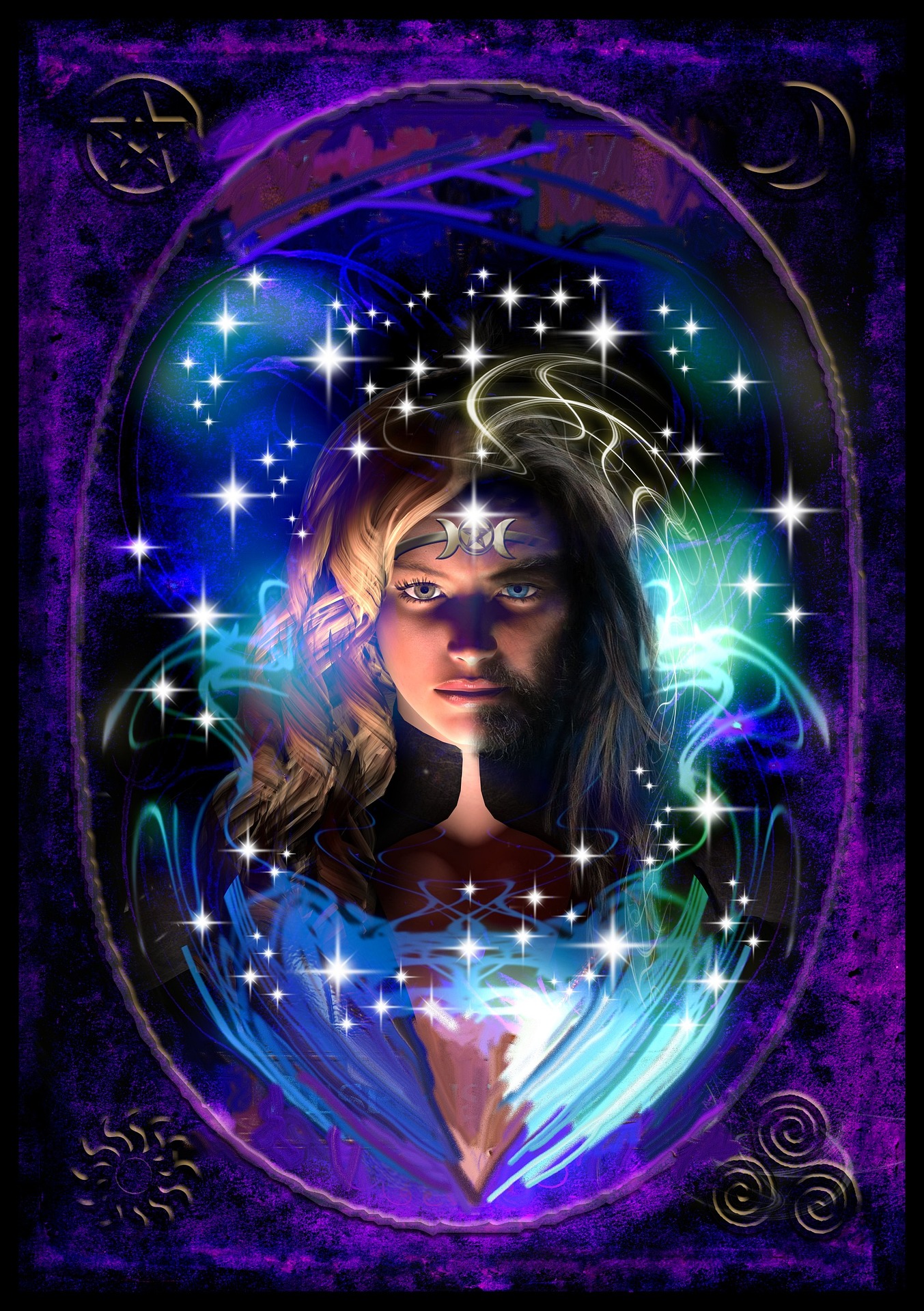Who can say where the divine soul comes from? Perhaps a demigod ancestor, some angel blood, or a blessing upon a family after performing a great service. However that power came to manifest, Divine Soul Sorcerers are a powerful subclass, both narratively and mechanically.
When you’re coming up with your character, think about how they learned of their magical powers. Did they manifest when you were a child? Did they come with the onset of puberty? Or are they something you’ve discovered as an adult? How did these powers change your life for the better or worse?
Table of Contents
Divine Soul Subclass Features
Like all subclasses, the Divine Soul Sorcerer gives you additional features at levels 1, 6, 14, and 18. These complement the base Sorcerer features and expand upon core aspects of how the Sorcerer works. Let’s dive into those features and see what they can do for your character.
Divine Magic
Your link to the divine allows you to learn spells from the cleric class. When your Spellcasting feature lets you learn or replace a Sorcerer cantrip or a Sorcerer spell of 1st level or higher, you can choose the new spell from the Cleric spell list or the Sorcerer spell list. You must otherwise obey all the restrictions for selecting the spell, and it becomes a Sorcerer spell for you.
In addition, choose an affinity for the source of your divine power: good, evil, law, chaos, or neutrality. You learn an additional spell based on that affinity, as shown below. It is a Sorcerer spell for you, but it doesn’t count against your number of Sorcerer spells known. If you later replace this spell, you must replace it with a spell from the Cleric spell list.
| Affinity | Spell |
| Good | cure wounds |
| Evil | inflict wounds |
| Law | bless |
| Chaos | bane |
| Neutrality | protection from evil and good |
Divine Magic is a nice feature that you get from the start of your adventures. Sorcerers have a very limited number of known spells, so getting one extra is fine, but the real greatness comes from having access to the Cleric spell list. On the one hand, it can cause some analysis paralysis since you have so few spells on your list at any given time, but, on the other hand, it opens up a whole range of support and offensive options.
If your party needs a healer but is missing a Druid or Cleric, Divine Soul isn’t a bad option at all. However, the best way to utilize this subclass isn’t to focus exclusively on healing, but on all-around support. Take one or two healing spells and then focus on Cleric spells that synergize well with your Metamagic options. Both death ward and guardian of faith can be extended to last 16 hours if you take Extended Spell.
Some spells, like guiding bolt, provide you with a solid way to inflict radiant damage (something that most Sorcerers don’t have access to), while others, like spiritual weapon, give you an excellent boost in damage per round. However you want to build your Sorcerer, it’s never a bad idea to have more options.
Favored by the Gods
Starting at 1st level, divine power guards your destiny. If you fail a saving throw or miss with an attack roll, you can roll 2d4 and add it to the total, possibly changing the outcome. Once you use this feature, you can’t use it again until you finish a short or long rest.
At low levels, this feature is a game changer. The fundamental math of Fifth Edition proves that small bonuses can make a world of difference. The average gained through advantage is +3 (the equivalent of a very rare weapon), and the minimum you can roll with this feature is +2. That’s the equivalent of a rare weapon, shield, or wand at level 1!
The average increase for Favored by the Gods is actually +4. Whether you’re using it to make a crucial attack hit your target or to avoid some horrific fate with a saving throw, +4 is often enough to push you over the edge of the DC, even at very high levels. Remember that this feature only kicks in after you’ve rolled, added any bonuses, and the DM has made a ruling.
You can stack Favored by the Gods with bless, resistance, the Lucky feat, features that allow rerolls, advantage, and even Bardic Inspiration. At a certain point, it becomes far less likely for you to fail the attack roll or saving throw than to succeed, no matter what level you are.
Empowered Healing
Starting at 6th level, the divine energy coursing through you can empower healing spells. Whenever you or an ally within 5 feet of you rolls dice to determine the number of hit points a spell restores, you can spend 1 sorcery point to reroll any number of those dice once, provided you aren’t incapacitated. You can use this feature only once per turn.
Unfortunately, this is a nearly meaningless feature that the majority of Divine Souls will almost never use throughout their entire adventuring careers. While Divine Souls ought to have at least one healing option, they aren’t typically the primary healers. Assuming you have a Cleric in your party, the likelihood of them standing right next to you to cast their spell is slim (since Clerics can wear armor and use shields) unless you’re currently knocked out.
Even if everything lines up, it’s very rare for them to roll so poorly that you’d want to waste one of your precious sorcery points on enrolling. And we do mean waste because you’re not spending the sorcery point for an automatically better roll or even an average. They could very well roll again, and it could be the same or worse than the first time.
Otherwordly Wings
Starting at 14th level, you can use a bonus action to manifest a pair of spectral wings from your back. While the wings are present, you have a flying speed of 30 feet. The wings last until you’re incapacitated, you die, or you dismiss them as a bonus action. The affinity you chose for your Divine Magic feature determines the appearance of the spectral wings: eagle wings for good or law, bat wings for evil or chaos, and dragonfly wings for neutrality.
Possible the best Divine Soul feature, you have unlimited flight that doesn’t require concentration starting at level 14. You’ve likely had access to flight for many levels by now, but the power of constant flying while being able to cast concentration spells cannot be overstated. It only takes a bonus action to manifest (or get rid of) your wings, so it doesn’t even consume an action.
We’d recommend always having your wings handy. Sure, your character may look a little weird, but unless you’re going to a no-fly zone or squeezing through a tight corridor, you should always have the ability to simply flap your wings and get out of Dodge, considering that Sorcerers have d6 hit points.
Unearthly Recovery
At 18th level, you gain the ability to overcome grievous injuries. As a bonus action, when you have fewer than half of your hit points remaining, you can regain a number of hit points equal to half your hit point maximum. Once you use this feature, you can’t use it again until you finish a long rest.
Unearthly Recovery is an awesome 18th level ability. At this level, you need to give the subclass something really special and being able to regain that many hit points with just a bonus action without disrupting concentration on a spell. While it’s true that healing a conscious creature is usually a waste of time, this feature lets you regain enough hit points without using up your action, and that’s totally worth it.
In the best-case scenario, you’d already have your Otherworldly Wings activated and be ready to fly away from whatever is hurting you while you use Unearthly Recovery so you can reposition yourself and use your action for a deadly strike.
Background Ideas
As the text notes, religious orders and devout practitioners might see Divine Souls as threats to their established hierarchies. Alternatively, they might see Divine Souls as the embodiment of their deities and include them in their cults, promote them to leadership positions, or raise them as sacrifices.
Were you expelled from your community as a child, forced to wander the world? Were you persecuted by religious extremists who feel threatened by your powers? There are plenty of interesting stories to write about a character with the blood of the gods running through their veins.
Some possible backgrounds that might work for a Divine Soul Sorcerer are:
- Acolyte
- Far Traveler
- Folk Hero
- Inheritor
How Powerful Is Divine Soul Compared to Other Subclasses?
This is a hard thing to weigh. Most of the Divine Soul’s features are decently strong, with the exception of Empowered Healing, and it is nice to have an extra spell added to your known spell list. However, with the release of Tasha’s Cauldron of Everything and its two new subclasses, the relative power of Divine Soul Sorcerer was suddenly and sharply diminished.
The two new subclasses give 10 or 11 extra known spells that Sorcerers can add to their lists. They also have the option to switch those spells out as they level up. Divine Soul Sorcerers only get a single spell, in comparison. The new subclass features equal the power of Divine Soul, but it’s hard to overcome the massive advantage inherent in nearly doubling the number of known Sorcerer spells (going from 15 known spells to 25-26 known spells).


